Educator Well-Being: Self-Compassion as the Ultimate Act of Self-Care
LISA BAYLIS WILL BE DELIVERING THE PRE-CONFERENCE SESSION, “CULTIVATING COURAGEOUS COMPASSION FOR LEADERS “, DURING EDCAN’S UPCOMING 2022 PAN-CANADIAN SUMMIT ON K-12 WORKPLACE WELLBEING.
Teaching in our current school system is hard work. There has never before been a time when educators were expected to take on so many roles, with more expectations and less support.
Teachers are exhausted and regularly facing burnout. Why? Because teachers care, and they are seeing more students struggle with academics due to lack of mental, emotional, and physical health resiliency.
Support staff are tired and don’t get paid nearly enough to support the educators and the students they work with one-on-one. Why? Because support staff care and they are seeing students and teachers struggle.
Administrators are weary. They are expected to be “on” at all times with no chance to recharge and to rest, and so they continue to push themselves and deliver. Why? Because administrators care about the school cultures they are leading.
We continue to push on, fake it, and survive. Educators are working with our most precious commodity – our children. Over the last few years, we’ve learned that if want to enable our kids to flourish then we need to take care of the adults that care for them.
Brain science tells us that children’s brains aren’t fully developed until they are 25 years-old. Until that age, children, teenagers, and young adults look to the developed brain of an adult for attunement and regulation. This helps their brains understand how and when to stay calm under stress. They use their mirror neurons to “mirror” the behaviour of others.
Have you ever walked into a room where everyone is frowning and instantly your stomach drops and your shoulders tense? Do you immediately, instinctively inhabit the same feelings? This is called ‘emotional contagion,’ and this is exactly what’s happening in schools. Kids are facing tough challenges and stress at home, at school, in their communities and – let’s face it – in our whole world right now, and they bring this stress with them to school.
Educators feel it and absorb this stress.
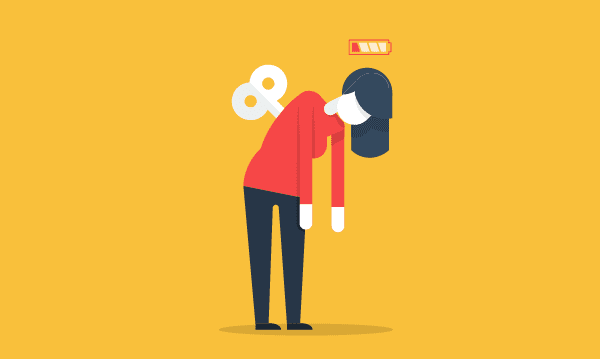
Many educators hold onto this stress and too often don’t have adequate self-care and self-compassion strategies to release the build-up. Therefore they burnout. Burnout rates for educators continue to skyrocket, while personal leaves, medical leaves, and sick days are going up. As our educators burnout, our students feel it — and the cycle of unwellness continues.
However, emotional contagion works with positive emotions as much as it does with the negative. When we focus on happiness, hope, gratitude, compassion, and joy we see a greater shift towards resiliency. By supporting the resiliency of our educators, we may simultaneously see this positive shift grow within our schools.
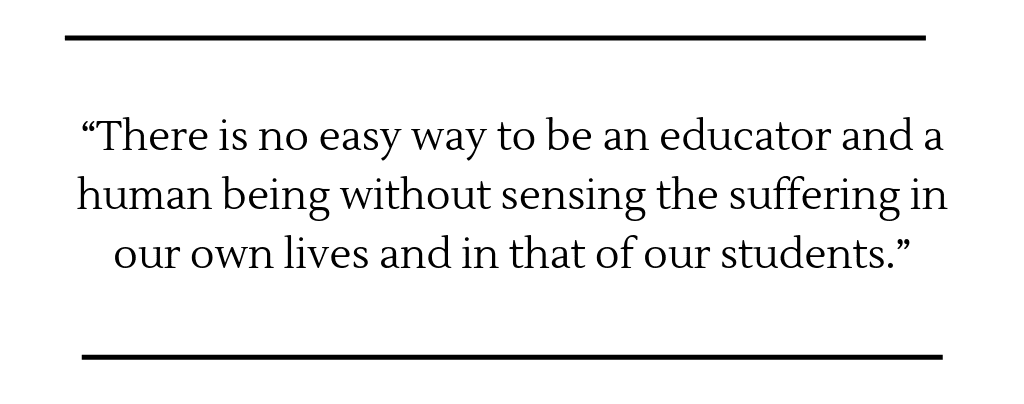
As a high school counsellor and teacher in the Greater Victoria School District in B.C. for the last 15 years, I have seen my own well-being teeter-totter along with the highs and lows of both my personal and professional life. I have become a mom, and have also seen youth in my schools die of overdose and suicide. I have engaged with colleagues in amazing learning opportunities, and have also been overwhelmed by the expectations placed on myself and my colleagues in the workplace. I have laughed out loud with students and seen them experience great joy in their learning, and I have also watched them struggle with tears in both our eyes.
I have ridden these ups and downs at times with ease and grace, and at other times while feeling like I was falling apart. There is no easy way to be an educator and a human being without sensing the suffering in our own lives and in that of our students. Through it all, I have learned some very important strategies that have helped me retain my composure, my resiliency, and my well-being.
As a practicing educator and counsellor in a challenging school of diverse learners, I know first-hand what burnout feels like. I have also repeatedly seen colleagues suffer from burnout and compassion fatigue. I believe we need to create space for educators to practice self-compassion, self-awareness, and well-being habits. In essence, educators need to be encouraged and supported to have a self-care practice to avoid burning out.
The ultimate act of self-care is a self-compassion practice. ‘Self-compassion’ means meeting ourselves during difficult and stressful times with the kindness and tenderness that you might offer to a dear friend or a small child. Kristin Neff suggests, “Instead of mercilessly judging and criticizing yourself for various inadequacies or shortcomings, self-compassion means you are kind and understanding when confronted with personal failings – after all, whoever said you were supposed to be perfect?”
There are three elements of mindful self-compassion to better care for ourselves and to calm the inner critic:
1. Mindfulness vs. Over-Identification
‘Mindfulness’ is a non-judgemental, receptive state of mind in which one observes their thoughts, feelings, and body as they are, without trying to suppress or deny them. Meeting these thoughts, feelings, and body sensations with kindness allow us to be present instead of over-identifying and being swept away by negative reactivity. By paying attention with kindness, we stay more present.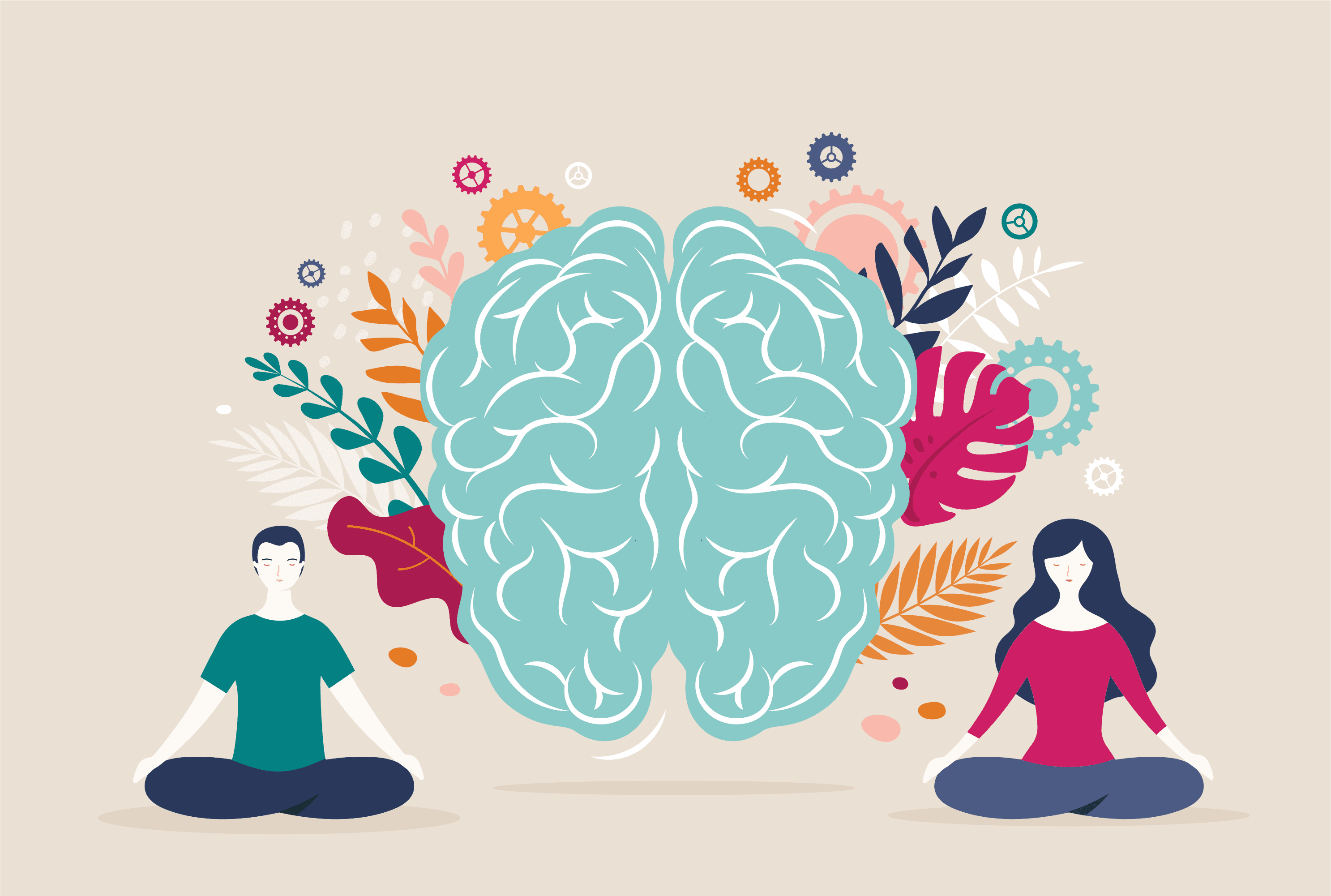
2. Common Humanity vs. IsolatioN
Often when we are suffering we tend to think we are alone. We believe that we are the only ones who may have felt this pain. So we hide away and keep our struggles to ourselves. With self-compassion, we are aware that all humans suffer and that we are never alone, and instead are part of a shared human experience. The very definition of being “human” means that one is mortal, vulnerable, and imperfect.
3. Self-Kindness vs. Self-Judgement
We are often quick to judge and criticize ourselves when we suffer, fail, or feel inadequate. However, self-compassion entails expressing warmth and understanding towards ourselves in these moments of suffering. Self-compassionate people recognize that being imperfect, failing, and experiencing life’s difficulties are inevitable, so they tend to be gentle with themselves when confronted with painful experiences rather than getting angry when life falls short of set ideals.
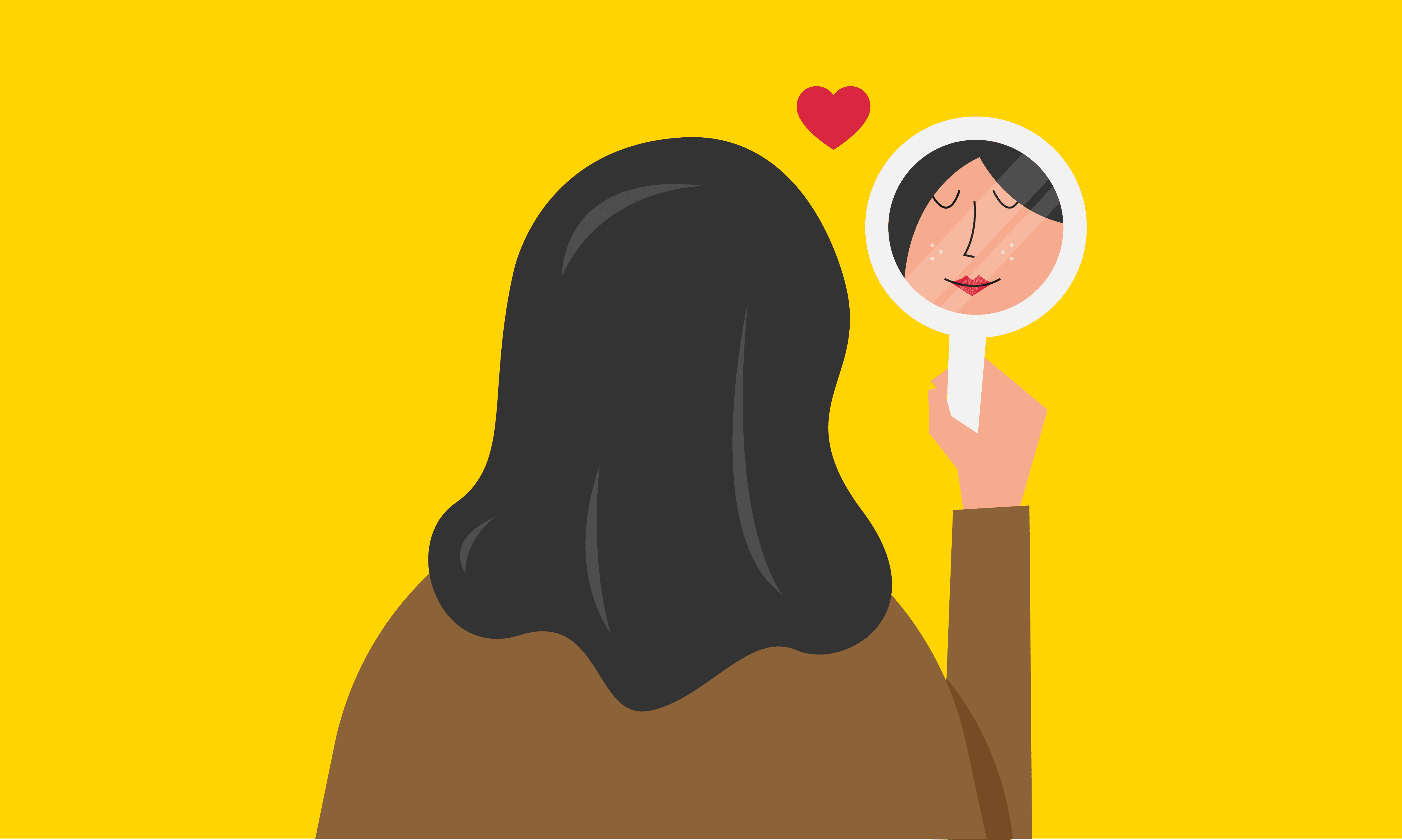
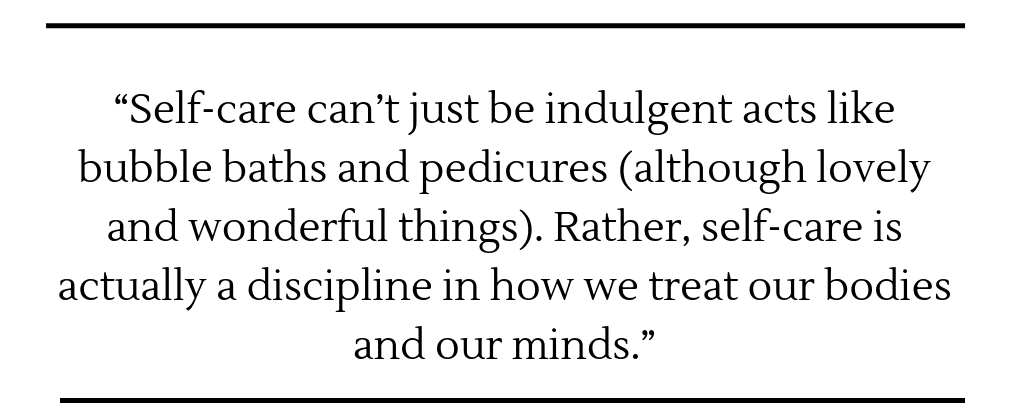
As I practiced and taught mindful self-compassion during the past few years, I have come to see it as an essential strategy in improving my own well-being. I often find myself slowing down and actually seeing what I need in any given moment to truly care for myself. I am also more conscious of my inner voice, and if it’s ever being unkind (as is so often the case for many of us), I ask myself if I would say what I’m saying to myself to my daughter – and if I wouldn’t, then I change the tone.
Mindful self-compassion is a practice that has changed my wellbeing and is the key component of my self-care practice. Self-care can’t just be indulgent acts like bubble baths and pedicures (although lovely and wonderful things). Rather, self-care is actually a discipline in how we treat our bodies and our minds. It’s boundary setting, saying no, discovering your values and living within them, and finding many ways to be kinder to ourselves.

Only when we have strongly focused on making our own well-being a priority will we see a shift in well-being in schools.
When we as educators feel emotionally regulated, physically strong, self-aware and socially connected we create a strong sense of well-being in our lives. Together, let’s find ways to rebuild our resiliency. Let’s focus on self-care AND self-compassion. Let’s reignite our passion for teaching. Let’s awaken educator well-being so that together we can get back to making a difference in our schools again.
First published in September 2019
LEARN MORE ABOUT the pan-Canadian summit, an EXCLUSIVE PROFESSIONAL LEARNING EXPERIENCE FOR DISTRICT TEAMS OF STAFF WELLBEING CHAMPIONS SEEKING CONCRETE WAYS TO EMBED AND SUSTAIN A HAPPIER AND HEALTHIER WORKPLACE CULTURE.

